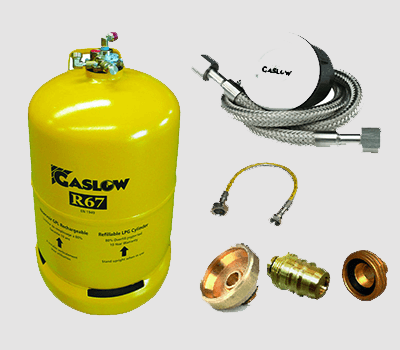Guide to Motorhome Gas Types
Published: March, 2023. Updated: March, 2024.
One crucial aspect of owning a motorhome is the type of gas used to power various appliances and systems within the vehicle.
The choice of gas can have a significant impact on your overall needs.
Here, we will explore two different types of LPG (Liquid Petroleum Gas) that are commonly used in a motorhomes and campervans, and discuss the benefits and disadvantages of each.
There are two types of LPG –Propane and Bupane. Let’s look at the differences between these two gases.
Versatility
Propane is one of the most common choices for motorhomes because it is better than Bupane at powering a larger number of appliances, including cooking stoves, fridges and heating systems.
Availability
Propane and Bupane are widely available in many countries, making it convenient for travellers.
In the UK, you can check the Camping-Gas website for dealers that sell different types of gas cylinders.
Keep in mind that Calor and Flogas are the UK's primary bottled gas providers, but neither are available in Europe.
To overcome this when travelling abroad, we carry a 13kg Propane Cylinder (actual weight when bottle is full is 35kg) and a 6kg Propane Cylinder (actual weight when bottle is full is 17kg).
When we travel abroad the 13kg cylinder lasts us 5 weeks and we often don't use the 6kg bottle.
As a back up in case we need to use more gas, we carry regulators for Spain, France and Italy, which would enable us to buy propane cylinders from these countries by attaching the appropriate regulator.
Alternatively, you could opt for a refillable cylinder that you can fill up at fuel stations.
Bear in mind that availability of Autogas pumps at fuel stations varies considerably across countries.
Clean Burning
Propane is a clean-burning fuel that produces fewer emissions, contributing to a more eco-friendly travel experience.
Cost-Effective
Propane and Butane are priced similarly and so from a cost effective perspective there is not much difference between the two.
Climate
Propane can be used in sub-zero temperatures whereas Butane may struggle to vaporize in very cold temperatures, affecting its efficiency.
Therefore, Butane works better in warmer temperatures.
Storage Space
Storing LPG cylinders can be challenging due to their size and weight, impacting the available space in your motorhome.
Indeed, you should consider your motorhome payload when thinking about using heavier gas cylinders.
Refilling Challenges
Finding LPG refill stations may be less convenient in some areas, so planning your route is essential.
Maintenance and Safety
All LPG appliances and fittings need regular checking and maintenance if they are to remain safe and reliable.
Safety precautions include turning off the gas before travelling, checking for leaks, and being aware of the dangers of carbon monoxide poisoning.
It's also recommended to fit a CO alarm and have suitable fire safety equipment on board.
Remember to ventilate your motorhome when using gas appliances.
Conclusion
The choice of gas for your motorhome depends on your travel preferences, destinations, and the type of motorhome you own.
Consider the benefits and disadvantages of each gas type and make an informed decision to enhance your motorhome adventures.
Whether you prioritise convenience or eco-friendliness, there is a suitable gas option for your motorhome.
Propane Gas
Check the Camping-Gas website for dealers that sell different types and sizes of gas cylinders.

